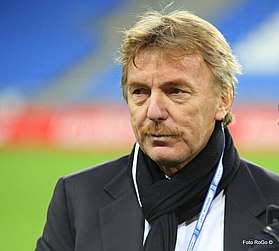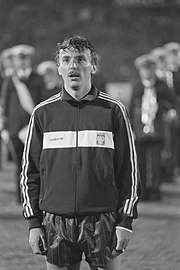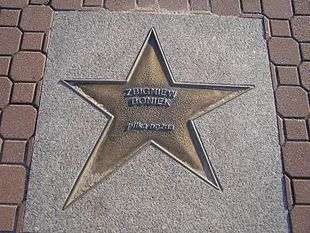Zbigniew Boniek
Zbigniew "Zibì" Kazimierz Boniek (Polish pronunciation: [ˈzbiɡɲɛv ˈbɔɲɛk];[lower-alpha 1] born 3 March 1956) is a Polish former footballer and manager and the current head of the Polish Football Association (PZPN). A former midfielder, who was also capable of playing mostly as a right winger and second striker, he is considered one of the greatest Polish players of all time,[1] and was selected by Pelé as one of the 100 best living footballers in 2004.[2]
Zbigniew Boniek | |||||||||||||||||||||||||||||||||||||||||||||||||||||||||||||||||||||||||||||
|---|---|---|---|---|---|---|---|---|---|---|---|---|---|---|---|---|---|---|---|---|---|---|---|---|---|---|---|---|---|---|---|---|---|---|---|---|---|---|---|---|---|---|---|---|---|---|---|---|---|---|---|---|---|---|---|---|---|---|---|---|---|---|---|---|---|---|---|---|---|---|---|---|---|---|---|---|---|
 Boniek in 2015 | |||||||||||||||||||||||||||||||||||||||||||||||||||||||||||||||||||||||||||||
| 26th President of the PZPN | |||||||||||||||||||||||||||||||||||||||||||||||||||||||||||||||||||||||||||||
| Assumed office 26 October 2012 | |||||||||||||||||||||||||||||||||||||||||||||||||||||||||||||||||||||||||||||
| Preceded by | Grzegorz Lato | ||||||||||||||||||||||||||||||||||||||||||||||||||||||||||||||||||||||||||||
| Personal details | |||||||||||||||||||||||||||||||||||||||||||||||||||||||||||||||||||||||||||||
| Born | 3 March 1956 Bydgoszcz, Poland | ||||||||||||||||||||||||||||||||||||||||||||||||||||||||||||||||||||||||||||
| Nationality | Polish | ||||||||||||||||||||||||||||||||||||||||||||||||||||||||||||||||||||||||||||
| Height | 1.81 m (5 ft 11 in) | ||||||||||||||||||||||||||||||||||||||||||||||||||||||||||||||||||||||||||||
| Occupation |
| ||||||||||||||||||||||||||||||||||||||||||||||||||||||||||||||||||||||||||||
| |||||||||||||||||||||||||||||||||||||||||||||||||||||||||||||||||||||||||||||
In an 80-cap international career, he scored 24 goals and played at three consecutive World Cups, helping Poland to 3rd place in 1982 and making the Team of the Tournament. His greatest achievements in club football were at Juventus in Italy, winning the Serie A, Coppa Italia, European Cup, European Cup Winners' Cup, and European Super Cup between 1983 and 1985, being the first Polish footballer to win a confederation title and one of the first Eastern European players to do so with a non-conational club.
In the early 1990s he managed several Italian clubs, and also the Polish national team in 2002. In 2019 he was inducted in the Italian Football Hall of Fame.
Club career
Boniek was born in Bydgoszcz. He first played for Polish clubs Zawisza Bydgoszcz and later at Widzew Łódź.
Boniek transferred to Italian football giants Juventus in 1982. With Juventus he won the Coppa Italia in his first season, also managing a second place finish in the league and reaching the 1983 European Cup Final in the same season. The following season, his performances proved decisive, as Juventus won both the Serie A title and the Cup Winners' Cup in 1984, with Boniek scoring the matching-winning goal in the 2–1 victory over Porto in the final of the latter tournament in Basel; he followed up these victories by claiming the European Super Cup later that year, scoring twice in the 2–0 win against Liverpool. He also won the European Cup in 1985, against Liverpool once again, winning the penalty that Michel Platini subsequently converted to win the title for Juventus, although the team's victory was largely overshadowed by the Heysel Disaster.[3][4][5][6]
The following season, Boniek joined Roma, where he won a second Coppa Italia in 1986, and eventually ended his professional career with the club in 1988.[3][4][5][6]
International career

Boniek represented Poland in 80 international matches between 1976 and 1988, and scored 24 goals. He took part at the 1978, 1982, and 1986 FIFA World Cups with Poland.[3][5][6]
Although he initially only appeared as a substitute in Poland's two opening group matches at the 1978 World Cup, he drew attention to himself when he scored two goals in a 3–1 victory over Mexico in Poland's final match of the group stage, helping his nation top their group; in the second round, however, Poland finished third in their group and were eliminated from the tournament.[3][5][6]
Boniek later starred in the Polish team that won a bronze medal at the 1982 FIFA World Cup in Spain: he helped his team reach the semi-finals of the tournament, scoring 4 goals in the process. In the first round, he scored in a 5–1 win over Peru on 22 June, to help Poland top their group; in the second round, he scored a hat-trick in his nation's 3–0 second round victory over Belgium, in Barcelona, on 28 June,[7] but was forced to miss the semi-final defeat to eventual champions Italy due to a suspension after being booked in the 88th minute of a 0–0 draw against the Soviet Union.[3][5][6]
He returned to the starting line-up for the victorious third-place match against France and was named to the team of the tournament for his performances throughout the competition. The 1986 World Cup was less successful, as Poland only qualified for the second round as the second best third-placed team, and were subsequently eliminated in the second round following a 4–0 defeat to Brazil.[3][5][6]
Style of play
Although Boniek was usually deployed as a midfielder, he was also able to play as a forward. He preferred to operate between the lines in a free role, although he was a versatile player, capable of playing in several offensive and midfield positions on either flank or through the centre, and throughout his career he was deployed as an attacking midfielder, as a right winger, in a playmaking role as a central midfielder, as a centre-forward, or as a second striker; his Juventus manager, Giovanni Trapattoni, however, often struggled to find the most suitable position for him.
Boniek was known for his extroverted personality and his trademark moustache, which made him a highly recognisable player. A tall, brave and hard-working footballer with a large, powerful, and slender physique, he was known for his blistering pace, acceleration, and quick reactions. In particular, Boniek was highly regarded for his ability to make sudden attacking runs to beat the defensive line and get on the end of his teammates' long passes, especially those of Michel Platini, with whom he formed a close friendship and formidable partnership at the Turin club, which made him lethal on counterattacks; this prompted Diego Maradona to describe Boniek as the best counterattacking player in the world.
A highly talented, creative, intelligent, and skilful footballer, he was one of the best dribblers of his time and also displayed superb technique, flair, and class. Although he was not a particularly prolific player, he was known for his eye for goal, and as his clinical finishing with either foot, as well as his head, which enabled him to maintain a consistent goalscoring rate throughout his career; he also earned a reputation for having the tendency to score decisive goals for his team in key matches.
Despite his ability, at times he was also criticised, however, for being tactically undisciplined, inconsistent, too static in his movements off the ball, and for not being involved enough in his team's play during matches, which led him to struggle against opponents who did not give him a lot of space.[3][4][5][6][8][9][10]
The Juventus president at the time of Boniek's tenure with the club, Gianni Agnelli, nicknamed him Bello di notte ("Beauty at night", which is a play on the title of the Buñuel movie Belle de Jour) because of his excellent performances in European club tournament matches, which were played in the evening; indeed, during continental tournaments, his opponents usually allowed him more space and time on the ball than in Serie A, which allowed him to get forward, undertake individual dribbling runs and score goals himself, or drop deep, link up with midfielders and create chances or provide assists for his teammates, courtesy of his passing, vision, and clever movement.[3][4][5][6][11] He was also nicknamed Zibì by the Italian press.[3]
Towards the end of his career, as he lost his pace, he often functioned in a defensive role as a sweeper.[6]
Managerial career
Following his retirement, Boniek pursued a coaching career, but with less success; he also coached in Italy, with stints at Lecce in 1990–91, Bari in 1991–92, Sambenedettese in 1992–93, and Avellino in 1994–96.[3]
Boniek has served as vice-president of the Polish Football Association, and in July 2002 he became the manager of Poland. He resigned in December 2002, after just five matches (2 wins, 1 draw, 2 defeats, including a 1–0 home loss against Latvia in a European Championship qualifier).[5]
Later career
Following his retirement, Boniek had a successful business career. He later also worked as a pundit and football commentator.[5] According to reports back in Poland, Boniek had been favored to become the new Minister of Sport for his country, but he denied the claims and stated that he had no intention of taking up the job.[12]
In 2004, Boniek was named by Pelé as one of the 125 Greatest Living Footballers, as part of FIFA's centenary celebrations.[2] On 12 October 2009, he received the Golden Foot 'Legend' career award.[13]
On 26 October 2012, he became the chairman of the Polish Football Association.[14] As the head of Polish football he is hugely popular with supporters due to his view on decriminalising football fans and in favour of legalising pyrotechnics inside stadiums, which is common ultras practice.[15]
Honduran international footballer Óscar Boniek García was given the middle name Boniek in honour of Zbigniew Boniek.[16] García chose to have the name "Boniek" written across the back of his jersey while playing for Houston.
Personal life
Boniek has a University diploma in education.[3]
Career statistics
Club
| Club | Season | League | Cup | Continental | Total | |||||
|---|---|---|---|---|---|---|---|---|---|---|
| Division | Apps | Goals | Apps | Goals | Apps | Goals | Apps | Goals | ||
| Widzew Łódź | 1975–76 | Ekstraklasa | 27 | 7 | 0 | 0 | 0 | 0 | 27 | 7 |
| 1976–77 | 24 | 9 | 1 | 0 | 0 | 0 | 25 | 9 | ||
| 1977–78 | 30 | 11 | 2 | 1 | 4 | 3 | 36 | 15 | ||
| 1978–79 | 28 | 4 | 1 | 1 | 0 | 0 | 29 | 5 | ||
| 1979–80 | 26 | 10 | 2 | 1 | 2 | 1 | 30 | 12 | ||
| 1980–81 | 11 | 1 | 0 | 0 | 5 | 0 | 16 | 1 | ||
| 1981–82 | 26 | 8 | 3 | 2 | 2 | 0 | 31 | 10 | ||
| Total | 172 | 50 | 9 | 5 | 13 | 4 | 194 | 59 | ||
| Juventus | 1982–83 | Serie A | 28 | 5 | 12 | 3 | 9 | 2 | 49 | 10 |
| 1983–84 | 27 | 3 | 6 | 2 | 9 | 4 | 42 | 9 | ||
| 1984–85 | 26 | 6 | 6 | 3 | 10 | 3 | 42 | 12 | ||
| Total | 81 | 14 | 24 | 8 | 28 | 9 | 133 | 31 | ||
| Roma | 1985–86 | Serie A | 29 | 7 | 5 | 1 | 0 | 0 | 34 | 8 |
| 1986–87 | 26 | 4 | 6 | 4 | 2 | 0 | 34 | 8 | ||
| 1987–88 | 21 | 6 | 3 | 1 | 0 | 0 | 24 | 7 | ||
| Total | 76 | 17 | 14 | 6 | 2 | 0 | 92 | 23 | ||
| Career total | 329 | 81 | 47 | 19 | 43 | 13 | 419 | 113 | ||
International goals

- Scores and results table. Poland's goal tally first:
| # | Date | Venue | Opponent | Result | Competition |
|---|---|---|---|---|---|
| 1 | 11 May 1976 | Basel, Switzerland | 1–2 | Friendly | |
| 2 | 31 October 1976 | Warsaw, Poland | 5–0 | FIFA World Cup 1978 qualifying | |
| 3 | 19 June 1977 | São Paulo, Brazil | 1–3 | Friendly | |
| 4 | 5 April 1978 | Poznań, Poland | 5–2 | Friendly | |
| 5 | 12 April 1978 | Łódź, Poland | 3–0 | Friendly | |
| 6 | 10 June 1978 | Rosario, Argentina | 3–1 | FIFA World Cup 1978 | |
| 7 | |||||
| 8 | 15 November 1978 | Wrocław, Poland | 2–0 | UEFA Euro 1980 qualifying | |
| 9 | 18 April 1979 | Leipzig, East Germany | 1–2 | UEFA Euro 1980 qualifying | |
| 10 | 2 May 1979 | Chorzów, Poland | 2–0 | UEFA Euro 1980 qualifying | |
| 11 | 29 August 1979 | Warsaw, Poland | 3–0 | Friendly | |
| 12 | 13 May 1980 | Frankfurt, West Germany | 1–3 | Friendly | |
| 13 | 28 May 1980 | Poznań, Poland | 1–0 | Friendly | |
| 14 | 28 October 1981 | Buenos Aires, Argentina | 2–1 | Friendly | |
| 15 | 15 November 1981 | Wrocław, Poland | 6–0 | FIFA World Cup 1982 qualifying | |
| 16 | 18 November 1981 | Łódź, Poland | 2–3 | Friendly | |
| 17 | 22 June 1982 | A Coruña, Spain | 5–1 | FIFA World Cup 1982 | |
| 18 | 28 June 1982 | Barcelona, Spain | 3–0 | FIFA World Cup 1982 | |
| 19 | |||||
| 20 | |||||
| 21 | 22 May 1983 | Chorzów, Poland | 1–1 | UEFA Euro 1984 qualifying | |
| 22 | 27 March 1984 | Zürich, Switzerland | 1–1 | Friendly | |
| 23 | 19 May 1985 | Athens, Greece | 4–1 | FIFA World Cup 1986 qualifying | |
| 24 | 30 May 1985 | Tirana, Albania | 1–0 | FIFA World Cup 1986 qualifying |
Honours
Club
.jpg)
Widzew Łódź
- Serie A: 1983–84
- Coppa Italia: 1982–83
- European Cup: 1984–85
- European Super Cup: 1984
- European Cup Winners' Cup: 1983–84
- Coppa Italia: 1985–86
Individual
- Piłka nożna magazine plebiscite: 1978, 1982[6]
- Ballon d'Or: Third place 1982[17]
- FIFA World Cup All-star Team: 1982[18]
- FIFA 100: 2004[2]
- Golden Foot Legends Award: 2009[19]
- FAI International Football Awards – International Personality: 2012[20]
- Italian Football Hall of Fame: 2019[21]
Orders
Zbigniew Boniek is a 3rd class knight of Order of Merit of the Italian Republic ![]()
Notes
- In isolation, Zbigniew is pronounced [ˈzbiɡɲɛf].
References
- "Zbigniew Boniek". PlanetWorldCup.com. Retrieved 13 March 2017.
- Christopher Davies (5 March 2004). "Pele open to ridicule over top hundred". The Telegraph. Retrieved 9 July 2015.
- Stefano Bedeschi (3 March 2017). "Gli eroi in bianconero: Zbigniew BONIEK" (in Italian). Tutto Juve. Retrieved 9 March 2017.
- Giuseppe Bagnati (31 October 2008). "Zibì Boniek, il bello di notte che fece litigare Roma e Juve". La Gazzetta dello Sport (in Italian). Retrieved 9 March 2017.
- "BONIEK Zbigniew: il bello di notte" (in Italian). Storie di Calcio. Retrieved 13 March 2017.
- "Juve and Poland's Beauty of the Night". FIFA.com. Retrieved 13 March 2017.
- GEORGE VECSEY (29 June 1982). "BONIEK IS THE WHOLE SHOW FOR POLAND". The New York Times. Retrieved 13 March 2017.
- "Pope regretted not praying for Polish team: player". ABC. 8 April 2005. Retrieved 13 March 2017.
- "Top 10: Goals of Spain '82". FourFourTwo. 2 June 2014. Retrieved 13 March 2017.
- Nick Bidwell (6 May 2003). "Real warned not to underestimate Juve". ESPN. Retrieved 13 March 2017.
- "Zico: Perfect XI". FourFourTwo. 1 November 2005. Retrieved 13 March 2017.
- "Polskie Radio Online".
- "Zbigniew Boniek to receive Golden Foot career award". ESPN. 2 October 2009. Retrieved 14 October 2009.
- "Kosecki wiceprezesem. Boniek wyciągnął rękę".
- "Wałkowanie Bońka. Zaparzcie kawę, przygotujcie prowiant, bo to naprawdę dużo czytania!". 19 January 2015.
- "MŚ: Boniek będzie kibicował... Bońkowi" (in Polish). onet.pl. 4 June 2010. Archived from the original on 29 February 2012. Retrieved 1 February 2014.
- "European Footballer of the Year ("Ballon d'Or") 1982". RSSSF. Retrieved 31 October 2016.
- "FIFA World Cup Awards: All-Star Teams". Retrieved 23 September 2015.
- "Legends". Golden Foot. Archived from the original on 25 September 2015. Retrieved 23 September 2015.
- "Stars honoured at 23rd International Awards". fai.ie. FAI. 3 February 2013. Archived from the original on 11 February 2015.
- "Pirlo, Mazzone, Boniek in Hall of Fame". Football Italia. 5 February 2020. Retrieved 7 February 2020.
- "Dettaglio decorato". Retrieved 29 June 2012.
External links
| Wikimedia Commons has media related to Zbigniew Boniek. |
- Zbigniew Boniek at 90minut.pl (in Polish)
- A song (in Polish) dedicated to Boniek
- BBC: Pele's list of the greatest
| Sporting positions | ||
|---|---|---|
| Preceded by Grzegorz Lato |
President of Polish Football Association 26 October 2012 – present |
Succeeded by Incumbent |